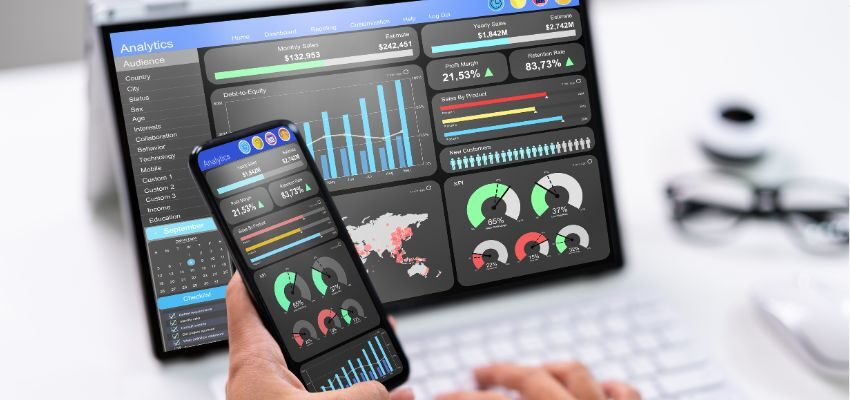Digital Marketing Benchmarks & KPIs – Comparing Performance

Published July 15, 2025
Are your marketing efforts actually working, or are you just guessing? In a digital world bursting with data, knowing how your brand performs is no longer optional. It’s a competitive edge. That’s where digital benchmarks come in.
Whether you’re struggling to track ROI or wondering how your KPIs stack up, digital benchmarking reveals the truth behind your performance. This guide breaks down essential metrics, shows you how to benchmark marketing strategies effectively, and even explores digital benchmarks by industry.
If you’re tired of operating in the dark, it’s time to measure smarter and market better. Let’s dive in.
What Are Digital Marketing Benchmarks?
Ever feel like you’re flying blind with your marketing strategy? Many brands hustle hard but don’t know how their performance stacks up. That’s where benchmarks come in. Think of them as your GPS in the digital world.
Digital marketing benchmarks let you compare your performance to industry standards, competitors, and best practices. They cut through the noise and guesswork, guiding you toward smarter decisions. They’re not just numbers, they’re context.
Because without context, metrics are meaningless. Let’s explore the benchmarks that tell you what’s working, what’s not, and where you’re falling behind.
Website Benchmarks: Where First Impressions Are Made
Your website is your digital storefront, and if it’s underperforming, you’re leaving money on the table. Site visitors decide whether to stay or bounce in mere seconds. That’s why website benchmarks are a marketer’s best friend.
From bounce rates and page views to mobile performance and load speed, each metric offers insight into your audience’s behavior. Do they come back? Do they convert? Is your homepage pulling its weight?
If your site isn’t converting traffic into customers, no amount of ads will save you. Start with the benchmarks that reveal how your digital first impression really lands.

SEO Benchmarks: Visibility Isn’t a Nice-to-Have
If your site isn’t ranking, it’s as good as invisible. SEO isn’t just technical, it’s existential. Benchmarking your SEO tells you how discoverable you are in a sea of competitors. Are your keywords ranking? Are your bounce rates scaring Google away? How many visitors come organically, and stay?
While 39% of buyers start with a search engine, only the top results get clicks. SEO benchmarks shine a light on your authority, relevance, and visibility. Ignore them, and you’re handing your traffic to your competition on a silver platter. Track, optimize, and rise.
Local Search & Google Business: The Digital Welcome Mat
Imagine a customer is nearby, phone in hand, ready to buy, and your competitor shows up instead. Brutal. Local SEO and your Google Business Profile are the unsung heroes of foot traffic and local visibility.
Benchmarks like NAP accuracy, review count, and image quality are often overlooked, but they make or break “near me” searches. With 28% of local searches resulting in a purchase, ranking in the local pack isn’t optional. It’s urgent.
Your presence on the map is your handshake before the sale. Benchmark it like your business depends on it, because it does.
Email Marketing Benchmarks: ROI’s Quiet Powerhouse
Email marketing isn’t dead. It’s a silent killer of ineffective channels. With an ROI of 4,200%, it’s still the heavyweight champ of digital ROI. But here’s the kicker: many brands blast emails without ever benchmarking performance.
What’s your open rate? Click-through rate? Unsubscribe rate? These aren’t just stats, they’re signals. They tell you what resonates and what repels. In an inbox flooded with noise, only the most relevant, timely, and personalized messages get noticed.
Use benchmarks to fine-tune your message and turn subscribers into loyalists. Email isn’t just communication, it’s conversion.

Social Media Benchmarks: Beyond the Vanity Metrics
Let’s be honest, likes feel good. But they don’t pay the bills. Social media benchmarking is about more than follower count. It’s about meaningful engagement. Are your videos retaining attention? Do certain post types outperform others? Are you posting often enough, or too much?
These answers lie in the data. Platforms reward consistency, creativity, and strategy. Social media benchmarks help you pivot from guessing to growing. Stop chasing trends and start chasing traction.
Because in today’s scroll-happy world, your content either stops the thumb, or gets buried.
Content Marketing Benchmarks: Is Your Content Pulling Its Weight?
You’re writing blogs. Producing videos. Sharing downloads. But is it working? Content marketing without benchmarks is like publishing in the dark. Are people reading it? Coming back? Converting?
Benchmarking content performance shows what to double down on and what to ditch. It’s not about more content, it’s about better content. From traffic sources to returning visitor rates, benchmarks reveal the soul of your strategy. And content mix? That’s your secret weapon.
The right blend, blogs, videos, and whitepapers keeps users engaged across every stage of the funnel. Stop creating randomly. Start creating intentionally.
Paid Advertising Benchmarks: Spend Smarter, Not Louder
The temptation to throw money at ads is real. But without benchmarks, you’re lighting that money on fire. Your cost per click, cost per action, and conversion rate should guide every dollar. Are you getting reach but not results? Are you paying too much for too little return?
Platforms like Google and Facebook change fast, and benchmarks keep you grounded. With Apple tightening privacy and users demanding relevance, your ads must perform or perish. Use data to fine-tune your messaging, targeting, and timing.
Because great ads aren’t louder, they’re smarter.
Reputation Benchmarks: Trust Is the New Currency
Think online reviews don’t matter? Ask your next customer. Today, 79% of consumers trust online reviews as much as personal recommendations. Your reputation isn’t just public, it’s powerful. Benchmark your average rating, review volume, and response time.
Are you silent when customers speak? Are you owning the narrative, or letting others write it for you? Your reputation lives on Google, Yelp, Glassdoor, and everywhere your name appears. It’s your brand’s credibility score.
And in a cancel-prone, credibility-driven world, managing it isn’t optional—it’s survival.
Customer Experience Benchmarks: Where Loyalty Lives (or Dies)
Let’s end with the heartbeat of your digital strategy: customer experience. CX is more than a buzzword. It’s the battleground for brand loyalty. Metrics like Net Promoter Score (NPS), retention rates, and post-purchase satisfaction tell you how your customers really feel.
Feelings drive decisions. Benchmarking CX isn’t just about pleasing, it’s about outperforming. In a world where expectations are sky-high and patience is low, the brands that win are the ones that feel effortless, personal, and human.
Make every touchpoint count, and measure it like your brand depends on it. Because it does.
FAQs
Are benchmarks compared to KPIs?
Yes! Benchmarks are numbers that show what is “normal” or “good” in your industry. KPIs are your brand’s numbers. You compare KPIs to benchmarks to see how well you’re doing.
How do you measure the performance of digital marketing?
You look at numbers like how many people visit your site, click your ads, or buy something. This is called tracking KPIs and comparing them to digital benchmarks.
What is a benchmark in digital marketing?
A digital benchmark is an average number from many businesses. It helps you see if your results are good, bad, or need work.
What is KPIs for digital marketing?
KPIs are important numbers that show how well your marketing is working. They tell you if people are clicking, buying, or signing up.
How do KPIs measure performance?
KPIs give you real numbers like clicks or sales. You can watch them to see if your marketing is helping your business grow.
Final Thoughts
Using digital benchmarks helps you see if your marketing is working well. By tracking numbers like clicks, visits, or new leads, you can know what to improve. These simple steps help you reach more people and grow your business.
Whether you’re checking your click-through rate, conversion rate, or cost per lead, it all adds up to smarter decisions. At Correct Digital, we make this easy. We help with SEO, ads, social media, websites, and more.
Our expert team gives your business the tools it needs to succeed online. Let us help you hit your marketing goals, fast and smart.
Hire The Digital Marketing Experts
We take online businesses and turn them into online empires by employing smart digital marketing strategies. Our team of experts are trained in a myriad of marketing skill including SEO to help you rank higher in search results, and ad management to ensure your message gets seen by the people you want. Need a business website that attracts business? We also specialize in website design and online sales optimization to help your business grow like never before.

This Content Has Been Reviewed For Accuracy By Experts
Our internal team of experts has fact-checked this content. Learn more about the editorial standard for our website here.

About The Author
Rei Bayucca has a wealth of knowledge and experience as a professional writer for multiple industries. It is her mission to ensure that her readers receive high-quality, informative content that is both entertaining and educational. Through her writing, Rei aims to educate and motivate readers.



